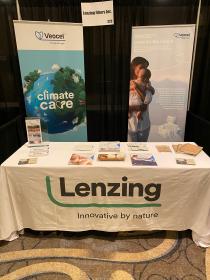VEOCEL™ showcased LENZING™ Lyocell Dry fiber
With the growing demand among brands and consumers for plastic-free materials and ingredient transparency, VEOCEL™, the flagship specialty nonwovens brand of Lenzing Group, showcased LENZING™ Lyocell Dry fiber at Hygienix 2023. LENZING™ Lyocell Dry fiber which is not classified as “plastic” according to EU SUPD, meets the growing interest for plastic-free nonwoven products across the industry and among consumers. Additionally, along with being an environment-friendly solution, the fiber delivers high-performance dryness and comfort which makes it the optimum fiber choice for absorbent hygiene applications.
Comprised of mostly fossil-based materials, absorbent hygiene products are an essential part of many consumers’ daily lives. With heightened concerns towards environmental impact, the product segment has been undergoing a change caused by shifting consumer preferences, increased consciousness and concerns towards plastic waste, and technology advancement. LENZING™ Lyocell Dry fiber has embraced these changes without compromising on quality or performance.
LENZING™ Lyocell Dry is a cellulosic environment-friendly wood-based alternative to fossil-based fibers. Besides offering great performance features such as liquid management, dryness, gentle-on-the-skin comfort, softness, and quality, LENZING™ Lyocell Dry helps to meet the needs of customers who are aiming to produce plastic-free applications or end products that do not harm the planet without compromising on performance or comfort.
Featuring Lenzing’s unique Dry technology, LENZING™ Lyocell Dry’s hydrophobic characteristics and liquid-controlling properties make it the ideal fiber for absorbent hygiene products. Its high-performing hydrophobicity makes it the optimal choice for a wide range of applications, including baby diapers, feminine care and personal hygiene products as well as adult incontinence products.
The fiber has consistently been tested by Lenzing as the softest* fiber among cellulosic fibers in both dry and wet stages. LENZING™ Lyocell Dry will enable brands and manufacturers to deliver quality hygiene products that provide a high level of comfort, softness, and dryness.
*Lenzing AG softness panel test
Lenzing Group








